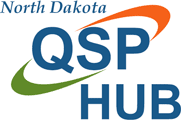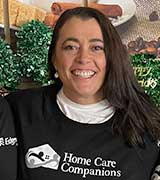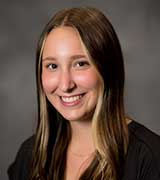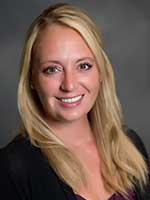Helping Those Who Help Others
By Jessica Rosencrans on
Rural communities are idyllic places to live for many. The remote and quiet qualities of such places become conductors for relaxation and tranquility. The strong bonds formed with neighbors and friends likewise root families to the area. But as residents age, the characteristics that may have drawn them in often become barriers. The tranquility becomes isolation. Limited healthcare services in small towns transforms into long commutes for care. In time, people face a painful question: will it be necessary to leave their homes and move to a location where care is more easily accessed?
Qualified Service Providers (QSPs) may provide a solution to this dilemma by bringing caregiving services to rural residents in their homes. A QSP is someone who provides care for individuals who qualify for home and community-based services from the North Dakota Department of Health and Human Services (ND DHHS). The individuals needing care are generally aging adults or adults with a physical disability. A QSP can provide an array of services, including personal care, chores, homemaker services, companionship, and transportation.
A QSP can either work as an individual, where they run their own business and have more autonomy over which clients they serve, or as an employee of a QSP agency. A select number of QSPs are considered Family Home Care Providers – someone who directly provides care to an individual who lives with them, usually a family member or a spouse. Currently, North Dakota has over 1,000 individual QSPs, 144 agencies, and 236 Family Home Care Providers.
A Hub of Information
 Because QSPs work to allow
aging in place to become a viable option in rural
communities, the QSPs themselves need support and
guidance. To support this ever-growing and vital segment
of the workforce, the North Dakota QSP Hub was
established.
Because QSPs work to allow
aging in place to become a viable option in rural
communities, the QSPs themselves need support and
guidance. To support this ever-growing and vital segment
of the workforce, the North Dakota QSP Hub was
established.
Housed at the Center for Rural Health (CRH) at the UND School of Medicine & Health Sciences, the North Dakota QSP Hub is just what it sounds like – a hub of information to help QSPs around the state with any questions they have. The basis for the QSP Hub was founded in the Money Follows the Person (MFP) grant. The MFP program focuses on increasing the use of home and community-based services and reducing the use of institutionally-based services.

"The idea of the grant is that individuals should be able to receive services in the least restrictive environment possible," Rebecca Quinn, director of the QSP Hub, explained. "It is meant to encourage the development and utilization of community-based services to allow residents to live where they want for as long as they would like."
When supplemental funding became available in 2021, creating a resource center for QSPs became a priority. CRH partnered with the ND DHHS to develop the work plan. The QSP Hub began receiving phone calls in April 2022 and now provides one-on-one technical assistance for enrollment, billing, and renewal support, small business development, topical training, new QSP orientation, and hosts an advisory group.
A Rewarding Experience

Missy Johnson, vice president of home care services at Home Care Companions, a QSP agency, has utilized the QSP Hub's services and notes how important they have become to QSPs.
"The QSP Hub has been essential for individual QSPs. We've had people call us for help, but there wasn't a lot we could do for them. The QSP Hub has stepped up as that resource that they can go to."
Johnson has worked at Home Care Companions for 15 years, owning and running the business for much of that time. In her time with the QSP agency, Johnson has watched it grow from a client base of about 50 to over 120 and expand to having locations in Grand Forks and Bismarck, North Dakota.

One of the 72 QSPs working at Home Care Companions is Jessa Anderson, a junior at UND majoring in biology with a goal to become an optometrist.
As a caregiver, she provides personal care, meal assistance, transportation services, and medication management, all the while gaining experience and furthering her passion for helping others.
It is so rewarding to build relationships with them and know you are making a huge difference in their lives.
"The people that I care for are so grateful to be able to stay in their home," Anderson said with a smile. "It is so rewarding to build relationships with them and know you are making a huge difference in their lives."
Becoming a Valued Resource
One particular challenge that the QSP Hub has helped navigate has been the implementation of the Electronic Visit Verification (EVV) System. The EVV System is a way to track care provided and hours worked by a QSP with a phone or computer. Before it was implemented, many QSPs were tracking the hours they worked on paper. Throughout this new process, QSPs have struggled to transition to the new digital system. Without a resource to turn to, many QSPs became burnt out.
"It really hurt Family Home Care," said Johnson. "Some QSPs joined an agency to manage the paperwork, but others became overwhelmed and bailed. We lost a lot of individual QSPs because of it, but with the QSP Hub, that doesn't have to be the outcome anymore."

Daniall Deis, education coordinator for the QSP Hub, expressed the appreciation the QSP Hub has received from QSPs.
"A lot of people are looking for reassurance that someone received their call or email and are usually okay if we don't have an answer right away. They're just looking for someone to talk to and acknowledge their challenges. We tend to be a resource that people hang on to."
These services are necessary. Just a two-hour visit a week can be life or death to some people and the QSP Hub is playing a vital role to keep it going.
Johnson agrees. "These services are necessary. Just a two-hour visit a week can be life or death to some people and the QSP Hub is playing a vital role to keep it going and aid those that are there. It wasn't always possible to stay at home and age in place, but now it's being supported and there are organizations in place that will help that happen."
Looking Ahead
The QSP Hub has made large strides in its first year of operation, and it is not slowing down anytime soon. Recruitment is one avenue that the organization – which is aiming to visit schools and campuses and host a career class on QSPs to bring new people to the field and educate the community – is excited to pursue.
"What we're doing now and everything that we've accomplished is just the beginning. Our plan is to continue to evolve and provide more and more support," said Deis. "We want to be the solid, supporting foundation for QSPs."
It does not get more rural than providing personal care for someone in their home to allow them to be able to stay in our communities.
"When I think about rural health," Quinn reflected, "it does not get more rural than providing personal care for someone in their home to allow them to be able to stay in our communities. This is the most basic, direct form of rural healthcare that you can provide. Our impact is two-fold. We're providing assistance so the individuals who need services can stay and keep communities vibrant, and it's creating employment opportunities in those rural areas."


 is the communication specialist with the Center for Rural
Health at the University of North Dakota School of
Medicine & Health Sciences in Grand Forks.
is the communication specialist with the Center for Rural
Health at the University of North Dakota School of
Medicine & Health Sciences in Grand Forks.



